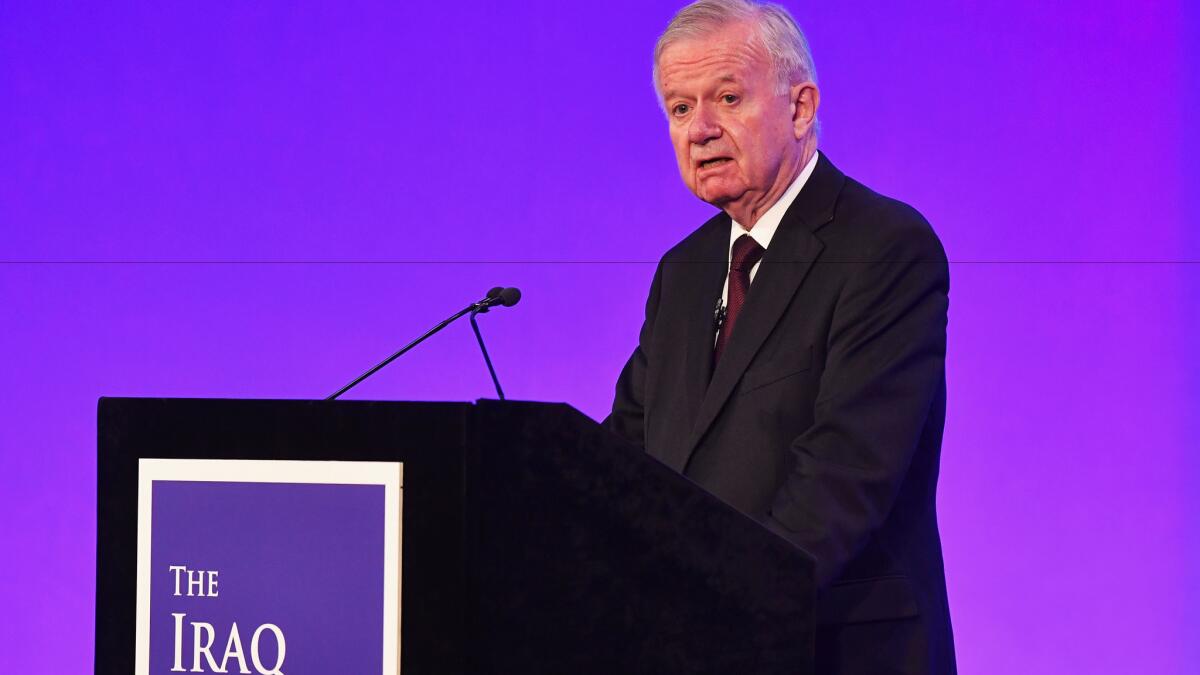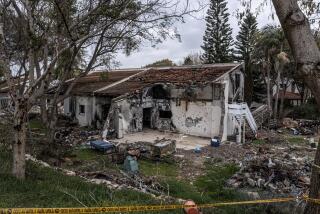British inquiry on Iraq war finds flawed intelligence, ‘wholly inadequate’ planning
- Share via
Reporting from London — Britain’s decision to join the U.S.-led invasion of Iraq in 2003 was based on flawed intelligence and inadequate planning and presented the public with misleading information about the threat posed by Saddam Hussein, according to a report released Wednesday.
The much-anticipated, government-commissioned report also said British troops were ill-prepared to be sent into battle and military action took place before all peaceful options had been exhausted.
“Military action at that time was not a last resort,” John Chilcot, a retired civil servant who oversaw the seven-year Iraq inquiry, said during a press conference in London.
Chilcot said there was “wholly inadequate” planning and preparation for the war and its aftermath. Ultimately, he said, the conflict ended “a very long way from success.”
NEWSLETTER: Get the day’s top headlines from Times Editor Davan Maharaj >>
The 2.6-million-word report is the culmination of interviews with 150 witnesses and analyses of 150,000 documents. It casts a pall over former Prime Minister Tony Blair’s tenure and reopens wounds for the families of servicemen who died in the war.
Chilcot, citing the report, said more than 200 British citizens and more than 150,000 Iraqis died because of the war, and more than 1 million people were displaced. The Department of Defense says more than 4,400 U.S. personnel died as a result of the war.
“It is now clear that policy on Iraq was made on the basis of flawed intelligence and assessments,” Chilcot said. “They were not challenged and they should have been.”
The report cites a memo Blair wrote to President George W. Bush in 2002 -- eight months before the Iraq invasion -- telling him: “I will be with you, whatever.”

Blair laid out the difficulties ahead: “The planning on this and the strategy are the toughest yet,” he wrote. “This is not Kosovo. This is not Afghanistan. It is not even the Gulf war” and acknowledged that he couldn’t be sure of getting support from Parliament, his party, the public or his cabinet.
The Iraq war was a hugely divisive moment in recent British history and tens of thousands of people took to the streets in protest.
The claim that Iraqi leader Hussein had weapons of mass destruction, ultimately found to be inaccurate, was used as justification for the decision to join the United States in the war.
The report criticized government intelligence, saying it had “not established beyond doubt” that Hussein had continued to produce chemical and biological weapons.
Chilcot said the inquiry found that the decision to invade Iraq was “an intervention that went badly wrong with consequences to this day.
“The people of Iraq have suffered greatly,” he said.
Chilcot did not say whether the invasion was illegal, but families of some of the soldiers who lost their lives in the conflict said they had not ruled it out legal action.
At a press conference immediately after Chilcot’s statement, Sarah O’Connor, whose brother, Sgt. Bob O’Connor of the Royal Air Force, was killed in the Iraq war, described Blair as “the world’s worst terrorist.”
A demonstration outside the conference center where Chilcot spoke included someone wearing a Blair mask with bloodied hands.
At a press conference later, Blair defended his action, saying it was the “most momentous, most agonizing decision” he had made during his 10 years running the country. He said he took full responsibility for the report’s findings, “without exception or excuse” even if he did not agree with some of the conclusions.
“I feel deeply and sincerely, in a way that no words can properly convey, the grief and suffering of those who lost ones they loved in Iraq,” Blair said.
Boyle is a special correspondent.
ALSO
For the first time, North Korea’s Kim Jong Un has been put on a sanctions list
Obama says troop levels in Afghanistan won’t be cut as he once pledged
UPDATES:
2:18 p.m.: This article was updated with Times reporting
This article was originally published at 4:16 a.m.
More to Read
Sign up for Essential California
The most important California stories and recommendations in your inbox every morning.
You may occasionally receive promotional content from the Los Angeles Times.













